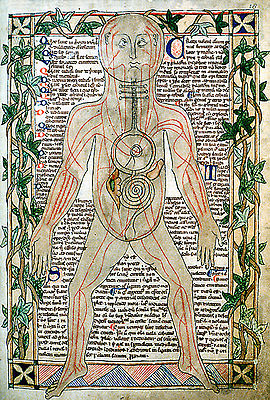
Theodoric Borgognoni
Encyclopedia

Dominican Order
The Order of Preachers , after the 15th century more commonly known as the Dominican Order or Dominicans, is a Catholic religious order founded by Saint Dominic and approved by Pope Honorius III on 22 December 1216 in France...
friar and Bishop of Cervia, Borgognoni is considered responsible for introducing and promoting important medical advances including basic antiseptic
Antiseptic
Antiseptics are antimicrobial substances that are applied to living tissue/skin to reduce the possibility of infection, sepsis, or putrefaction...
practice in surgery and the use of anaesthetics.
Life
Theodoric Borgognoni was born in LuccaLucca
Lucca is a city and comune in Tuscany, central Italy, situated on the river Serchio in a fertile plainnear the Tyrrhenian Sea. It is the capital city of the Province of Lucca...
, Italy in 1205. He may well have been the son of Master Ugo Borgognoni, a leading physician of the previous generation, and was certainly a student of his. Theodoric studied medicine at the University of Bologna
University of Bologna
The Alma Mater Studiorum - University of Bologna is the oldest continually operating university in the world, the word 'universitas' being first used by this institution at its foundation. The true date of its founding is uncertain, but believed by most accounts to have been 1088...
becoming a Dominican friar in the same period. In the 1240s, he became personal physician
Physician
A physician is a health care provider who practices the profession of medicine, which is concerned with promoting, maintaining or restoring human health through the study, diagnosis, and treatment of disease, injury and other physical and mental impairments...
to Pope Innocent IV. In 1262 he was made Bishop of Bitonto. He then served as Bishop of Cervia, close to Ravenna
Ravenna
Ravenna is the capital city of the Province of Ravenna in the Emilia-Romagna region of Italy and the second largest comune in Italy by land area, although, at , it is little more than half the size of the largest comune, Rome...
, from 1266 until his death in 1296.
Achievements
Borgognoni practiced surgery in addition to his episcopal and religious duties. Despite this, he became the favoured practitioner of many leading personages, including the pope. His major medical work is the Cyrurgia, a systematic four volume treatise covering all aspects of surgery. The book broke with many traditional surgical practices handed down from the ancient Greeks and the Arabic surgeons. Borgognoni was significant in stressing the importance of personal experience and observation as opposed to a blind reliance upon the ancient sources. He insisted that the practice of encouraging the development of pus in wounds, handed down from GalenGalen
Aelius Galenus or Claudius Galenus , better known as Galen of Pergamon , was a prominent Roman physician, surgeon and philosopher...
and from Arabic medicine be replaced by a more antiseptic approach, with the wound being cleaned and then sutured to promote healing. Bandages were to be pre-soaked in wine as a form of disinfectant. He also promoted the use of aneasthetics in surgery. A sponge soaked in a dissolved solution of opium, mandrake, hemlock, mulberry juice, ivy and other substances was held beneath the patients nose to induce unconsciousness.
In addition to his surgical works, Borgognoni also produced volumes on veterinary medicine
Veterinary medicine
Veterinary Medicine is the branch of science that deals with the prevention, diagnosis and treatment of disease, disorder and injury in non-human animals...
and falconry
Falconry
Falconry is "the taking of wild quarry in its natural state and habitat by means of a trained raptor". There are two traditional terms used to describe a person involved in falconry: a falconer flies a falcon; an austringer flies a hawk or an eagle...
.
The Cyrurgia
The Cyrurgia, or Chirurgia, (Surgery), is Borgognoni's major contribution to western medicine. Written in the mid 13th Century, it is a four volume work that covers the major fields of medieval surgery. On the treatment of wounds he wrote: "For it is not necessary that bloody matter (pus) be generated in wounds -- for there can be no error greater than this, and nothing else which impedes nature so much, and prolongs the sickness." This went against a longstanding weight of medical thinking. Although often disagreeing with GalenGalen
Aelius Galenus or Claudius Galenus , better known as Galen of Pergamon , was a prominent Roman physician, surgeon and philosopher...
, Borgognoni followed him in promoting the dry method for treating wounds, although advocating the use of wine. He wrote on the treatment of thoracic and intestinal injuries, insisting on the importance of avoiding pollution from the contents of the gut. The final volume deals with injuries to the head and some cancers. Borgognoni's test for the diagnosis of shoulder dislocation, namely the ability to touch the opposite ear or shoulder with the hand of the affected arm, has remained in use into modern times.
It has been claimed that parts of Borgognoni's work duplicate chapters of the Chirurgia of Bruno da Longoburgo, written around fifteen years previously, and there is little doubt that some passages have the same source, and both were students of Ugo Borgognoni. However Theodoric's work contains much that is not duplicated in the book of Longoburgo, or which directly contradicts him, and these are often the most important and innovative passages.
See also
- Medieval science
- Medieval medicineMedieval medicineMedieval medicine in Western Europe was composed of a mixture of existing ideas from antiquity, spiritual influences and what Claude Lévi-Strauss identifies as the "shamanistic complex" and "social consensus." In this era, there was no tradition of scientific medicine, and observations went...
- History of medicineHistory of medicineAll human societies have medical beliefs that provide explanations for birth, death, and disease. Throughout history, illness has been attributed to witchcraft, demons, astral influence, or the will of the gods...
- Anaesthesia
- List of Roman Catholic scientist-clerics

